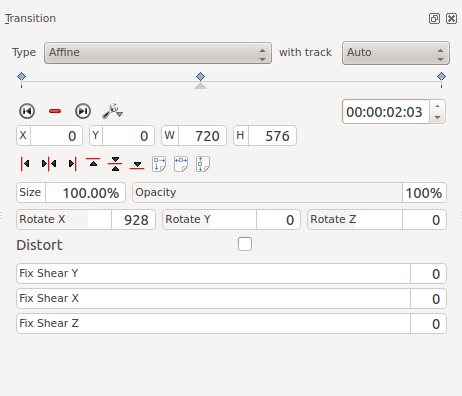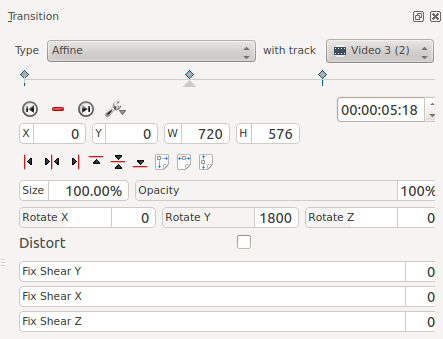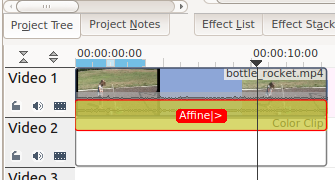Kdenlive/Manual/Transitions/Affine: Difference between revisions
(create page - assuming that this transition used to be called AffineComposite) |
No edit summary |
||
| (11 intermediate revisions by 2 users not shown) | |||
| Line 1: | Line 1: | ||
<languages/> | |||
== Affine Transition == | <translate> | ||
=== Affine Transition === <!--T:1--> | |||
<!--T:2--> | |||
Generates image rotation in 3D space, skew and distortion. | Generates image rotation in 3D space, skew and distortion. | ||
<!--T:3--> | |||
Provides keyframable animated affine transformations with dissolve functionality. | |||
<!--T:4--> | |||
In many applications, this transition can be used instead of a [[Special:MyLanguage/Kdenlive/Manual/Transitions/Composite|Composite]] transition and this provides a workaround to the composite transition "green tinge" bug reported by some. (Mantis #[http://www.kdenlive.org/mantis/view.php?id=2759 2759]) | |||
==== Example 1 ==== <!--T:5--> | |||
{{#ev:youtube|hylowKurZaw}} | {{#ev:youtube|hylowKurZaw}} | ||
<!--T:6--> | |||
[[File:Kdenlive Affine transition.png|frame|left|Affine Transition]] | |||
<br clear=all> | |||
====Disolve using Affine Transition ==== <!--T:7--> | |||
<!--T:8--> | |||
To add a Dissolve, change the opacity to zero percent. | |||
==== Rotation using Affine Transition ==== <!--T:9--> | |||
<!--T:10--> | |||
To rotate the image, add a keyframe and enter values for rotation. The units are 10ths of degrees. (e.g. 900 = 90 degree rotation). | |||
<!--T:11--> | |||
'''Rotate X''' rotates the frame in the plane of the screen. | |||
<!--T:12--> | |||
'''Rotate Y''' and '''Rotate Z''' create the illusion of 3D rotation when used dynamically with keyframes - see example below. | |||
<!--T:13--> | |||
You can create a similar effect using the [[Special:MyLanguage/Kdenlive/Manual/Effects/Crop_and_transform/Rotate_(keyframable)|Rotate (keyframable) ]] effect from the Crop and Transform group. | |||
==== Example 2 - Rotate Y ==== <!--T:14--> | |||
<!--T:15--> | |||
{{#ev:youtube|IAWMIL7c9K4}} | |||
<!--T:16--> | |||
This example is created using 3 keyframes. The second keyframe is shown below with a '''Rotate Y''' value of 1800 (=180 degrees). Keyframe one and keyframe three both have '''Rotate Y''' values of zero. | |||
<!--T:17--> | |||
[[File:Kdenlive Affine rotate kf2.png|frame|left|Keyframe two]] | |||
<!--T:18--> | |||
[[Image:Kdenlive Affine rotate timeline.png|frame|left|Timeline for this demo clip]] | |||
<!--T:19--> | |||
<br clear=all> | |||
The difference between '''Rotate Y''' and '''Rotate Z''' is that the apparent rotation in '''Rotate Y''' appears to be around a horizontal axis. The rotation in '''Rotate Z''' appears to be around a vertical axis | |||
<!--T:20--> | |||
{{Prevnext2 | |||
| prevpage=Special:MyLanguage/Kdenlive/Manual/Transitions | |||
| prevtext=Transitions | |||
| index=Special:MyLanguage/Kdenlive/Manual | indextext=Back to menu | |||
}} | |||
<!--T:21--> | |||
[[Category:Kdenlive]] | |||
</translate> | |||
Latest revision as of 00:26, 13 April 2015
Affine Transition
Generates image rotation in 3D space, skew and distortion.
Provides keyframable animated affine transformations with dissolve functionality.
In many applications, this transition can be used instead of a Composite transition and this provides a workaround to the composite transition "green tinge" bug reported by some. (Mantis #2759)
Example 1
{{#ev:youtube|hylowKurZaw}}

Disolve using Affine Transition
To add a Dissolve, change the opacity to zero percent.
Rotation using Affine Transition
To rotate the image, add a keyframe and enter values for rotation. The units are 10ths of degrees. (e.g. 900 = 90 degree rotation).
Rotate X rotates the frame in the plane of the screen.
Rotate Y and Rotate Z create the illusion of 3D rotation when used dynamically with keyframes - see example below.
You can create a similar effect using the Rotate (keyframable) effect from the Crop and Transform group.
Example 2 - Rotate Y
{{#ev:youtube|IAWMIL7c9K4}}
This example is created using 3 keyframes. The second keyframe is shown below with a Rotate Y value of 1800 (=180 degrees). Keyframe one and keyframe three both have Rotate Y values of zero.


The difference between Rotate Y and Rotate Z is that the apparent rotation in Rotate Y appears to be around a horizontal axis. The rotation in Rotate Z appears to be around a vertical axis
